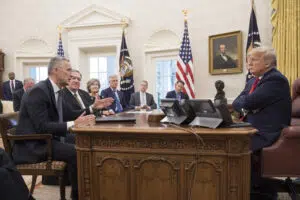Brussels – The US presidential race is seriously starting to concern Brussels, and not just the European Union. With the latest threats from former President Donald Trump – running to become the Republican nominee in the 2024 election – all of NATO finds itself in a nightmare that, in the last years of Joe Biden‘s Democratic presidency, seemed to be behind us. “Any suggestion that allies will not defend each other undermines all of our security, including that of the US, and puts American and European soldiers at increased risk,” North Atlantic Treaty Organization Secretary General Jens Stoltenberg, said, responding to Trump’s threats that Washington would not defend allies who do not spend enough on defense from Russian aggression.

At a rally in South Carolina on Saturday (Feb. 10) Trump used very harsh words against the other 30 NATO allies, recounting a purported conversation in his years as president: “One of the presidents of a big country stood up and said, ‘Well, sir, if we don’t pay, and we’re attacked by Russia, will you protect us?’ I said, ‘You didn’t pay, you’re delinquent?’ No, I would not protect you. In fact, I would encourage them [the Russians ndr] to do whatever the hell they want.” The prospect is disturbing considering the possible re-election of The Donald to the White House and Republican’s skepticism in Congress in providing further military and financial support to Kyiv and risks of the conflict expanding to Europe. This is why the comments outraged not only Stoltenberg but also leaders EU institutions and EU member states, just days before the NATO Defense Ministers’ Summit scheduled for Thursday (Feb. 15) and the Munich Security Conference between Friday and Sunday (Feb. 16-18), when these issues will be discussed.
“The Transatlantic Alliance has underpinned the security and the prosperity of Americans, Canadians, and Europeans for 75 years. Reckless statements on #NATO’s security and Art 5 solidarity serve only Putin’s interest. They do not bring more security or peace to the world,” European Council President Charles Michel said on X. “On the contrary, they reemphasize the need for the #EU to urgently further develop its strategic autonomy and invest in its defense. And to keep our Alliance strong,” he added. Belgian Prime Minister and current president of the EU Council, Alexander De Croo reiterated that “our greatest asset in the face of Putin is our unity, and the last thing we should do is to compromise it.” Dry was the comment of the EU High Representative for Foreign Affairs and Security Policy, Josep Borrell, who talked about “a silly idea that comes during this electoral campaign in the United States.” NATO cannot be an alliance “à la carte”. It exists, or it does not exist, ” Borrell added. Poland’s Defense Minister, Władysław Kosiniak-Kamysz, warned that “no election campaign is an excuse to play games with the security of the Alliance,” while Germany’s Foreign Ministry published on X the motto “one for all and all for one,” recalling that “NATO keeps more than 950 million people safe – from Anchorage to Erzurum.”
“ I expect that regardless of who wins the presidential election, the U.S. will remain a strong and committed NATO ally,“ NATO Secretary General Stoltenberg summed up: “ Any attack on NATO will be met with a united and forceful response.” Two issues are at the heart of the matter: national defense investments and NATO’s Article 5. In 2014, the allies agreed on a goal of spending at least 2 percent of GDP on defense and security, although several Alliance member countries (including Italy) still haven’t achieved this target. Article 5 of the North Atlantic Treaty states that an attack against an ally is an attack against every component of the Alliance and that, consequently, each of the 31 NATO countries “will assist the Party or Parties so attacked by taking forthwith, individually and in concert with the other Parties, such action as it deems necessary, including the use of armed force.” In other words, this is a collective mutual defense clause, which can be activated (but not necessarily or mandatorily) in case of an attack on a NATO member. “If my opponent, Donald Trump, is able to regain power, he is making it clear as day that he will abandon our NATO allies if Russia attacks and allow Russia to ‘do whatever the hell they want’ with them,” US President and likely Democratic nominee Joe Biden said.
English version by the Translation Service of Withub







